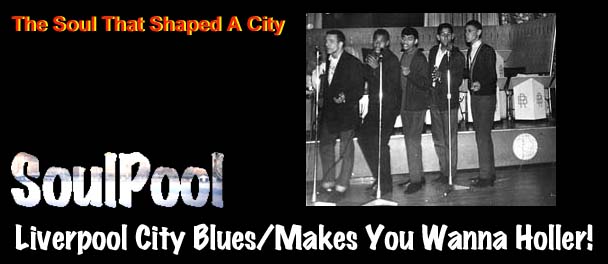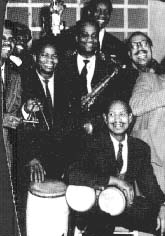
Picture in banner above shows the Earls at the Rialto c1960. Left to right, Joey Grant, Tony Fayal, Sugar Dean, Lawrence Areety, and Okin Eyo.
"LIVERPOOL CITY BLUES/MAKES YOU WANNA HOLLER!"
The Beatles/Merseybeat festival recently took place over the August bank holiday weekend. It will come as no surprise that besides there being a lack of Black faces, there was a total failure to ensure that the major role played by local Black musicians within the local music scene of that era was recognised.
It should not surprise anyone that when we first discussed the idea with an independent film company from London, they were asking about where they could get info on the Chants, as they are seen as the definitive and in fact the first example of British Doo-Wop. Of course we had to tell them that there is very little local acknowledgement of the importance of the Chants within the musical culture on Merseyside.
 It
is a major problem because with the outpouring of articles, books and
journals concerning the sixties and Merseyside, one could be forgiven
for thinking that Liverpool had become a musical oasis, primarily for
its own music. Yet it is forgotten that as the Beatles and other groups
went global, kids locally started to listen and dance to the "gut-bucket"
soul music pouring into the city from Detroit, Chicago and Memphis, and
local favourites were binned accordingly. Local Black bands had their
own crossover followings. Proof of the power of music to break down barriers.
A lot of kids had their own soul heroes on their doorsteps. We had the
Shuffler-Sound, the keyboard player, Ivor Ali, was our Booker T, as anyone
who heard him play "Green Onions" or "Time is Tight", would rightly testify
to.
It
is a major problem because with the outpouring of articles, books and
journals concerning the sixties and Merseyside, one could be forgiven
for thinking that Liverpool had become a musical oasis, primarily for
its own music. Yet it is forgotten that as the Beatles and other groups
went global, kids locally started to listen and dance to the "gut-bucket"
soul music pouring into the city from Detroit, Chicago and Memphis, and
local favourites were binned accordingly. Local Black bands had their
own crossover followings. Proof of the power of music to break down barriers.
A lot of kids had their own soul heroes on their doorsteps. We had the
Shuffler-Sound, the keyboard player, Ivor Ali, was our Booker T, as anyone
who heard him play "Green Onions" or "Time is Tight", would rightly testify
to.
Only lately has the
balance started to be redressed. The documentary "Who Put The Beat in
Merseybeat", shown two years ago, was a welcome attempt on that score
and vividly painted a rich tapestry of inter-woven influences. The music
of the local  Afro/Caribbean
community, jazz, calypso, Black American GIs, plus the role of gospel
- "Close your eyes and imagine". The impact was similar when young white
groups of Liverpool seamen, sailing up the Hudson River in the late 194Os,
tuned in the ship's radio and collided with the rhythmic sounds of Black
America, forever touched by the awesome power of a music straight from
the soul. The job of documenting a complete history of Black music on
Merseyside would be a huge task. All we can do within the limited confines
of present documented evidence is to allow the people who were there to
become our local historians. The local movers and shakers of soul, of
sweet soul music, can take us there. It is imperative that their contributions
are recognised instead of being marginalised.
Afro/Caribbean
community, jazz, calypso, Black American GIs, plus the role of gospel
- "Close your eyes and imagine". The impact was similar when young white
groups of Liverpool seamen, sailing up the Hudson River in the late 194Os,
tuned in the ship's radio and collided with the rhythmic sounds of Black
America, forever touched by the awesome power of a music straight from
the soul. The job of documenting a complete history of Black music on
Merseyside would be a huge task. All we can do within the limited confines
of present documented evidence is to allow the people who were there to
become our local historians. The local movers and shakers of soul, of
sweet soul music, can take us there. It is imperative that their contributions
are recognised instead of being marginalised.
 MAYBE
THEN WE WILL NOT FEEL THE NEED TO HOLLER.
MAYBE
THEN WE WILL NOT FEEL THE NEED TO HOLLER.
Pic below left -(copyright Bill Harry. Printed with permission)
 |
 |
 |

